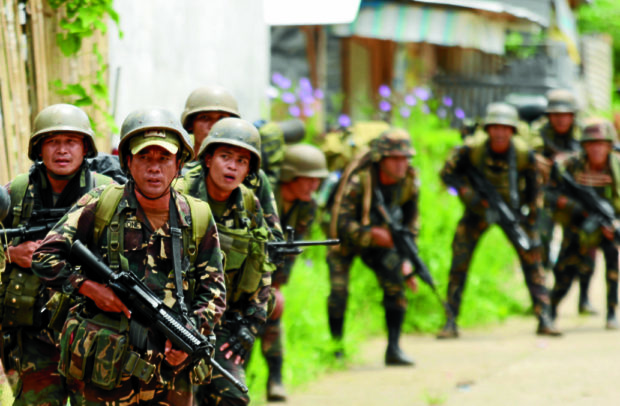Gov’t alarmed by IS group threat

CLEARING MISSION Soldiersmaneuver street by street and block by block to ridMarawi City of Islamist terrorists on Monday.
PHOTO BY JEOFFREY MAITEM / INQUIRER MINDANAO
Malacañang on Tuesday said it was concerned over reports that the Islamic State (IS) group had ordered more attacks during the holy month of Ramadan, including in the Philippines, as it disclosed that terrorists battling government forces in Marawi City had killed five more civilians.
Presidential spokesperson Ernesto Abella said the government would respond to any terrorist attacks “with continued decisiveness.”
An audio message purporting to come from Abi al-Hassan al-Muhajer, spokesperson for IS, on Monday called for followers to launch attacks in the United States, Europe, Russia, Australia, Iraq, Syria, Iran and the Philippines during Ramadan, which began on May 26. (See related story on this page.)
Abella said the threat would be factored in as the government tried to meet its goal of freeing Marawi from the clutches of IS-inspired Maute and Abu Sayyaf terrorists as soon as possible.
The military campaign in Marawi entered its fourth week on Tuesday after missing a self-imposed deadline of June 12 to clear the city of the terrorists.
Article continues after this advertisement“The fight will continue. We will not stop until it’s finished,” Abella told reporters.
Article continues after this advertisement
5 more civilians killed
“The President has been very supportive and is quite emphatic that Marawi should be totally settled, and not only Marawi but also the terrorist threats should be completely addressed [on] the entire island of Mindanao,” he said.
The military should be credited for the “great advances” it had achieved, he added.
Abella said five more civilians were killed by the gunmen in Marawi, bringing the civilian death toll to 26 as of Tuesday.
He said the five civilians were among 18 people hiding in a house in Marawi when gunmen knocked on the door. Frightened, the civilians ran for it using the backdoor. But the gunmen went after them and opened fire, killing five.
Eight of the civilians were taken hostage, and five others were rescued by state forces, Abella said.
The number of civilians rescued from Marawi stood at 1,618 as of Tuesday. There were reports that many more civilians remained trapped in parts of the city where terrorists were holed up.
Fifty-eight soldiers and policemen have been killed since the fighting started on May 23.
Urban terrain
The military conceded on Tuesday that troops were struggling to loosen the grip of the terrorists on downtown parts of the city despite relentless bombing.
Brig. Gen. Restituto Padilla Jr. said the urban terrain was hampering the Army’s progress because the terrorists were hunkered down in built-up neighborhoods, many of them with civilians they had taken as human shields.
Asked when the fighting would end, Padilla said: “I can’t give you an estimate because of compounding developments faced by ground commanders.”
The military had set Monday, Independence Day, as a target date to flush out the terrorists, both local and foreign fighters who had pledged allegiance to IS, the jihadist group that is on the back foot in Iraq and Syria.
The national flag was raised in Marawi on Monday as gunfire rang out from parts of the city where government troops were locked in combat with the terrorists and OV-10 attack planes took turns dropping bombs on terrorist positions.
Mosques targeted
The military said on Tuesday it had been forced to target mosques in airstrikes because the terrorists had taken refuge in those places of worship.
“They are using the mosques. The sacredness [of the mosques] is gone as the Maute used these in their military activities,” said Lt. Col. Jo-Ar Herrera, spokesperson for the Army’s 1st Infantry Division.
“As you can see, they are making these (mosques) their logistical hubs and sniper’s nests,” he added.
As long as the terrorists use the mosques as cover, these will be targeted “to save lives” and “to protect our troops,” Herrera said.
He said the Maute group’s leaders, brothers Omarkhayam and Abdullah Maute, and Abu Sayyaf leader Isnilon Hapilon, said to be the “emir” of IS in Southeast Asia, were believed to be still in Marawi.
Sources said on Monday, however, that Abdullah Maute was directing the fighting. Hapilon, they said, was not in the war zone.
There was no word about Omarkhayam Maute.
The sources said Abdullah Maute went around in a pickup every morning to encourage his men to fight on.
IS claim
The terrorists control about 20 percent of Marawi, more than twice the area the military cited last week, according to IS Amaq news agency.
Asked to comment on how much of Marawi was still occupied as the siege entered its fourth week, Lt. Gen. Carlito Galvez, chief of the military’s Western Mindanao Command, told Reuters it was 20 percent.
“Out of 90 barangays, they are holding portions in Marinaut, Lulut, Mapandi and Bongolo commercial district, which only comprise 20 percent of the whole Marawi City …. and it’s getting smaller every day,” Galvez said. —WITH REPORTS FROM JEOFFREY MAITEM